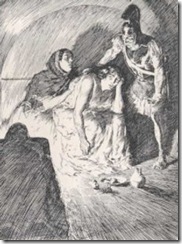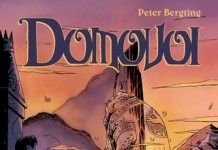This is part 5 of a 5 part interview with 84 year old Ohio author Jack Matthews. See also: Part 1 ,Part 2 , Part 3, Part4. Also: Jack Matthews (an introduction), Jack Matthews: The Art and Sport of Book Collecting and On Choosing the Right Name for a story character by Jack Matthews.
The mobile phone is emerging as an important way for people to read; indeed, in Asian countries, authors are already writing specifically for phone owners. The challenge is writing in smaller chunks — so the reader is not required to read for extended periods on a smaller screen and can easily resume where he/she left off. For poetry, this isn’t a problem, but what about fiction? Does limiting chapter length to (for example) 400 or 500 words reduce the dramatic or literary potential for the story writer?
I don’t know — I like the rhetorical short jab (Obama mastered it by dropping his voice to briefly pause after every 5 to 15 words, suggesting conclusiveness, authority & mastery of the material, & this unfortunately got him elected). As for the technical modifications: I’m at a loss. I like to tell people that I’m still getting used to electric lights. A touch of hyperbole there, but I also collect antiquarian books.
Do you think the ideas that led to your stories (and novels) could have been repurposed into bite-sized chunks for a cell phone?
Only in the sense that a story’s or novel’s key situation can sometimes be contracted into one or two sentences. I once wrote a condensed version of Petronius‘ Widow of Ephesus in 200 words (see below). This works beautifully for what it is; for what it is not (i.e., a fully textured narrative), it doesn’t. Sound like double talk? Yes & no.
THE WIDOW OF EPHESUS
(From the SATYRICON, as retold by Jack Matthews. Read the original version by Petronius).
Long ago, when the Romans ruled the earth, a rich merchant died, and his young widow was so bereaved that she accompanied him to his tomb, saying that the prospect of life without him was unendurable, and she would starve herself to death.
Near the tomb stood a soldier, guarding the corpse of a criminal that had been nailed to a cross. From where he stood, the soldier could see through the portal of the tomb, and the sight of the young widow aroused his passion, for she was beautiful.
Eventually, he took some of his food to her, asking her to eat; but she refused, saying that she was determined to join her husband in death. But the soldier persisted, until eventually the young widow accepted some of the food he offered and ate. Then the two of them began to talk of various things, until finally–even in the cold darkness of the tomb–they began to feel a mutual passion which led to their making love.
When the soldier emerged from the tomb, however, he saw that the family of the dead criminal whose body he had been guarding had stolen his corpse from the cross so that they could bury it decently. Seeing this, the soldier said to the widow, "Now it is all over for me, because according to the law, I will be executed and my corpse will be hung in his place."
"No," she said. "Take my dead husband’s body and put it there. I have lost one love, but I will not lose another."
Note:
Could this story be developed into a short story of conventional length? Of course: the scenes could be boxed and extended; the pace could be slowed, the texture (diction, "style") enriched and elaborated, the point of view could be negotiated (change in POV is often a fault, but only because it isn’t done well; it can be done with grace and elegance), a sub-plot could be introduced, and all of the materials of "pointedness" could be brought in to enrich and broaden the story–which will, of course, then be not the same story at all but a different story utilizing what is essentially the same key situation..
Also note the narrative turns that structure this little story, each turn signified by a new paragraph. Paragraphing is an art in itself, a way of designing the story the way a musical score serves as a structural device for that other temporal art of music.
Would the effort to turn Anna Karenina into bite-sized chunks for the Iphone be only an interesting-but-futile exercise?
More futile than interesting, I suspect.
Booking in the Heartland (1986) has an essay, "Library of Ignorance," where you ask, "will any conceivable sort of electronic gadgetry prove useful in understanding the subtleties of language and custom implicated in the works of Anthony Trollope or Henry James? Could anybody seriously argue that the availability of such electronic means would have enlarged or enriched their own clear and complex vision of life? … The electronic revolution has done nothing to invalidate the old truths, just as it has not provided any new means for exposing any of the old idiocies that have permeated and probably always will permeate the human condition." You expressed this skepticism about technology in 1986. 20+ years later, have you had any reason to revise your views? Has the internet and email substantially altered the individual’s ability to understand and appreciate literature?
I still think and feel pretty much the same way. In one of my essays, "What Should We Do With The Past?" I argue about the necessity for understanding what and who have gone before. I like Hamlet’s implied definition of humankind as "a creature large in discourse, looking before and after" (note that the "before and after" can mean their very opposites, depending upon our perspective, because from within, ”before” is the Future; from without, it’s the Past. And, hey, isn’t that fun?
How closely do you follow recent current events and popular culture? For example: Michael Jackson’s death. Global warming. Octomom. The latest Harry Potter movie. The new Iphone. The American Idol competition. H1n1. The Iranian protests. Facebook?
I find the Press terminally stupid and obnoxious. The INCREDIBLE attention given to Michael Jackson (what did he ever do but transform himself into a marionette & manage to whirl around with a microphone in his paw?)–did he walk on water? I’ve never read the Harry Potter novels, but my wife likes them. And I saw one of the movies, which struck me as a typically mindless Hollywood production with the implied audience of an 11-year-old boy, and I don’t mean a bright 11-year-old boy. The American Idol — I’ve only heard of it. The Iranian protests? Lamentable. I feel for the protesters. "Octomom" is an obscenity; the world’s worst crisis is over-population, and some air-wit like this whelps 8 of the little puppies? And the physician who presided over the blessed event is an even greater obscenity.
Some of the media attention given to figures like Michael Jackson may be driven by the music industry eager to sell more cds. However, the public still responds with intense interest to these shared narratives. Is something seriously wrong with that?
There’s some validity to what you say, of course. I contributed an essay to a book of writers responding to 9/11; I titled it, "Reaching For The Other Hand"–referring to what I call "the Men/De Principle" — focusing upon 2 small words in classical Greek, men/de—men meaning "on the one hand" & de meaning "on the other hand"; I like to tell my students that all of European civilization has grown out of these 2 words, which are the source of philosophy, dialectic, democracy (all Greek words), trial by jury and the 2-party system. Thus, interesting questions and the answers to implicit ones, are almost invariably subject to men/de qualifications, as are my thesis, above, and your antithesis.
Nowadays audio books, story podcasts and live storytelling events have thrust the story creator into the additional role as performer. I personally feel that some stories benefit by not being read aloud. What are your thoughts?
I think you’re right, although I don’t think language should ever lose its echo in sound. The cult of speed reading, as it flourished a few decades ago, was an egregious folly in this way. I wrote a brief poem once about a speed reader who read a sonnet in a few seconds. Implicit in this folly, I think, are the notions that reading is an escape from life and there is a mystical entity — "content" — that somehow exists independently of the language. Reading is an enlargement of life, not an escape; & the words, including their sounds, ARE the content. What else could “content” be?
As for reading in silence: I think the great power of good fiction is best released by one’s own personal voice being cast for the part of narrator.
You’ve taught several generations of writing students at Ohio University. What trends have you have noticed in the writing of your students over the last decade (in terms of subject matter, genre, style, etc)?
Hard to say. Sci Fi & Fantasy are big with them, but I’m not sure they’re bigger now than several decades back. I think one rather heartbreaking but ridiculous, problem I find so often is the naiveté of students about what’s involved in making a good story. Maybe in high school they’ve been praised as "imaginative" by an assistant basketball coach who had to take over an English course because he spoke English , and now they think they’re gifted writers and the world’s eager to read their infatuations. A lazy and benighted self-infatuation is pretty hard to work with; of course, as writers, we’re all egotists — but then, non-writers are, also. Schopenhauer understood this. What alternative is there for a human being, when all we know is what we are? Here’s a versicle I wrote on the subject:
ASTROPHYSICAL
Cosmologists have theorized or guessed that all the atoms, molecules and quarks of the universe itself were once compressed into some utter density of matter only slightly larger than a grapefruit sphere. We're used to being astonished by such patter from scientists; but still we're dazed by the utter extravagance of this strange notion-- to think that mountains, continents and trees, and stars and moons and semi-trucks and oceans could all be packed into so small a space . . . how can one conceive of such a place? I think the only vessel that might contain such enormities is the human brain-- a little larger than a grapefruit, I'll admit, but for the magnitude of worlds, a perfect fit.
It’s hard (and perhaps futile) to teach writing in a creative writing class. Can you mention a few favorite writing tips you give to your students?
First, I like to analyze the familiar question: "Can you teach Creative Writing?" Seems simple and sensible, but it contains 3 variables: 1) whom are you asking, 2) who will be taught, & 3) exactly what do you mean by "teach"? In my classes I like to emphasize the importance of absorbing great continents of information. All stories, no matter how fanciful, consist of information, and it behooves a serious young writer to simply know a hell of a lot so s/he can draw upon it for fictioning. Also, dig deep until you touch the mystery of things; as Ford Madox Ford (I think it was) said, "Upon close examination, a good literary style will consist of a lot of small surprises." And where do those surprises come from but an ability to pluck from the riches in a mind’s lexicon?
One of my favorite assignments, however, is what I call a “piggy-back journal”—students are asked to choose sentences about the craft of writing taken from the published notebooks, diaries and journals of established writers, then write a sentence or two in response.
Blogging tools and the Internet makes it easy to publish online. Do you counsel your writing students to avoid publishing too much or too quickly on the web?
I don’t know enough about it to caution them. I’m a little antsy about the whole thing, but part of that is simply a reflection of my grumpy old age & of course one’s natural fear of the unknown.
Nanowrimo (National Writing Month) is a crazy literary activity where those who sign up resolve to write a 50,000 word novel in November. It has become very popular among young writers, if only for its community aspects. If asked, would you recommend this type of exercise for your creative writing students? Why or why not?
I don’t know. I’ve never heard of it. In many ways, I’m a dinosaur — although a happy one. Sometimes almost as dumb as "Tommy Tyrannosaurus" — a name I’ve actually come upon in the sickening, Disney-ish attempt to cute-ify everything within reach, or without. I once wrote a short story featuring Tommy T. and Trixie Triceratops. I sent it out and it was rejected as being "too silly"-but of course that’s what I INTENDED! Ah, well.
Let me rephrase that question. Is it good for a young writer to have an excuse to plunge into a project of novel length (even if it’s only for practice)?
I think anything that invites you to "plunge into a project" is good, or has the potential to be good; we have a lot of mistakes to get out of our systems before we can do justice to the high art of prose.
A related trend in Internet writing is "shared universes" (where different writers create fiction that share common settings or characters in the same literary universe). Literary collaboration has worked fairly well in drama and TV/film, but what about novels and stories? Are you comfortable with the idea of a fiction writer subsuming his own literary ideas within a shared universe for the sake of increasing exposure?
These all seem hopelessly gimmicky to me, and yet there’s obviously some vigorous imagination at work . . . and I suspect a lot of fun. So, who knows? I don’t. Although I can profess a certain distrust in literary collaboration. Writing is such a chest-pounding thing.

































